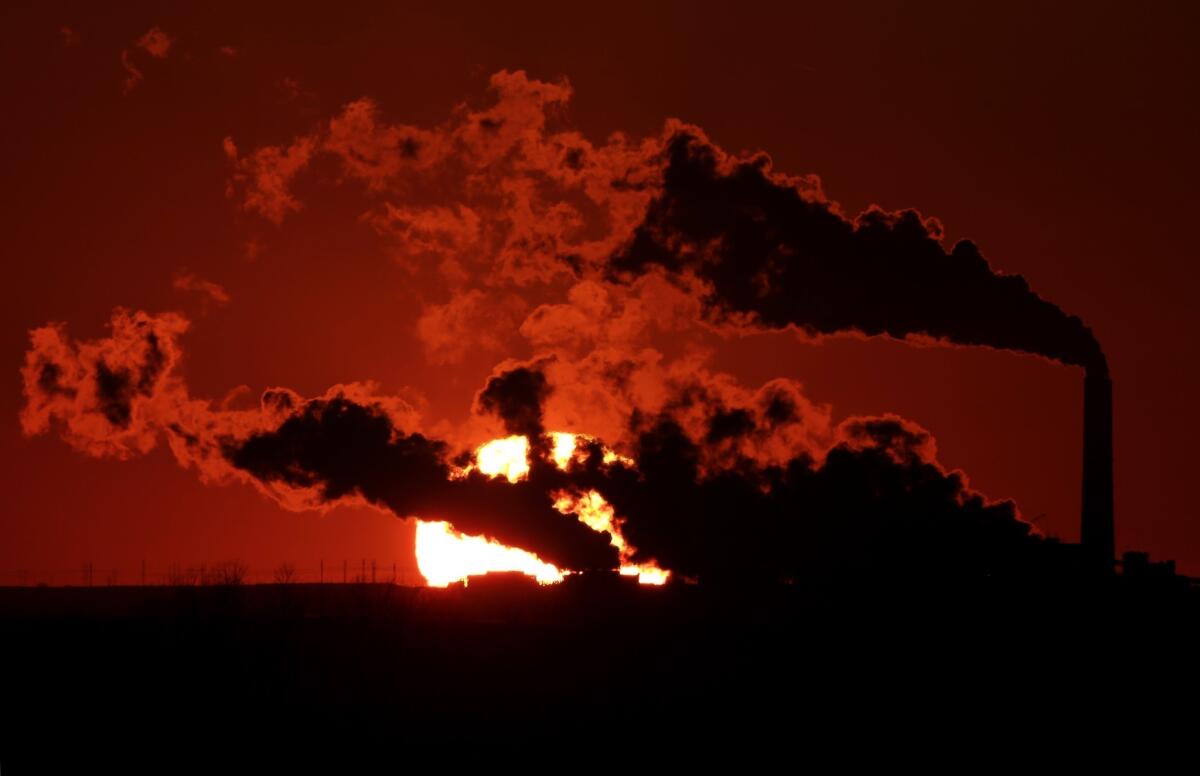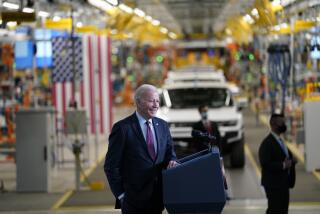EPA’s new emissions rule may complicate Democrats’ electoral hopes

Mitch McConnell and Alison Lundergan Grimes, bitter rivals in one of the nation’s most competitive Senate races this year, will find rare accord Monday as they both denounce the Obama administration’s new approach to cutting carbon emissions.
But how the Republican senator from Kentucky and his Democratic challenger manage to agree so disagreeably will illustrate the complicated politics of an issue that now takes on new prominence in this midterm election year.
The Environmental Protection Agency announced Monday that it will seek to cut greenhouse-gas emissions from existing power plants 30% by 2030, one of the more ambitious efforts by any administration to tackle the effects of climate change.
But the president’s attempt to build on his domestic policy legacy in the closing years of his administration is likely to spark new criticisms from Republicans long opposed to what they have called anti-business regulatory schemes, and fresh concern from Democrats eager to find political daylight between themselves and the White House.
“Today’s announcement is a dagger in the heart of the American middle class, and to representative democracy itself,” McConnell said Monday. “Already reeling from the painful effects of Obamacare, the American people are now being told they have to shoulder the burdens of the president’s latest ‘solution’ in the form of higher costs, fewer jobs, and a less reliable energy grid.”
McConnell’s fervent opposition to what he calls the administration’s “War on Coal” is central to his candidacy. If given another term, McConnell tells voters, he would continue to use his influence as the Senate’s top Republican – and potentially its majority leader – to block any new regulation that would hurt the state’s coal industry.
“In two and a half years Barack Obama will be gone. The coal will still be in the ground,” he said at one recent campaign stop.
This week McConnell plans to introduce legislation to block any new “national energy tax,” which he says the EPA rule would represent. The House in March passed a preemptive bill seeking to prevent the new rules from taking effect.
McConnell’s campaign, meanwhile, is linking financial backers of his opponent to environmental lobbyists who worked with the administration to develop the proposal.
But Grimes will be ready to engage as well, using the moment as a major opportunity to demonstrate independence from the national Democratic Party. Her campaign says this week she’ll launch “an aggressive, multi-platform push” to highlight her advocacy on behalf of the coal industry. She’ll also accuse McConnell of fostering gridlock that led the White House to seek administrative remedy on climate.
“This administration has taken direct aim at Kentucky’s coal industry, crippling the commonwealth’s largest source of domestic energy and threatening thousands of jobs,” Grimes spokeswoman Charly Norton said. “In the U.S. Senate, Alison will spare no effort to persuade Washington’s policymakers that a coherent, rational national energy policy must have a meaningful, long-term place for coal.”
Grimes’ approach mirrors one taken by other Democrats who ran on Republican turf in the past. In 2012, Heidi Heitkamp of North Dakota said in one of her advertisements that she would fight Obama on the Keystone Pipeline and oppose cap-and-trade schemes if elected.
“If you want a senator who only votes the party line … then I’m probably not your candidate,” Heitkamp said in the spot, which a Democratic strategist pointed to as an example of a successful strategy other Democrats in tough races could employ this year.
But some of those Democrats are not disguising their view that the announcement, as well as its timing, will make things harder for them this fall.
“I know that attack [is] coming regardless of what I do, whether I speak out or whether I’m silent, whether I try to work with the administration as I have in the past or whether I lash out and burn all bridges that are left,” said Rep. Nick J. Rahall, a veteran West Virginia Democrat who is a top GOP target.
“The timing’s awkward,” said Rep. John Yarmuth, the lone Kentucky Democrat in Congress. But he acknowledged that it could boost other Democrats in tough races by bringing out their base voters.
“The core constituencies that we rely on are very strongly in favor of tough environmental standards, particularly young people,” he said. “This may be the kind of energizer, no pun intended, that helps bring them out.”
The White House is aware of the potential peril for some in the party. On Sunday some Democrats from fossil fuel-dependent states had individual calls with administration officials ahead of the public roll out of its new plan. Their consultation came with a polite request, according to a staffer briefed on one conversation: criticize the plan if you must, but narrow the critique to focus on the economic impact on your state, rather than the overall efficacy of the plan.
In a way, the president’s announcement could be more problematic for Democrats in states without a dominant energy interest like coal is to Kentucky or West Virginia. While Grimes can use the issue to align herself with the clear interests of her state, Democrats elsewhere must thread a needle between supporting an issue with appeal to the base while fending off Republican attacks that the proposal is a job-killer.
In New Hampshire, for instance, Republican Senate hopeful Scott Brown is launching a “Making Energy Affordable” tour this week to discuss his own energy plan. The first point of that plan appears to be an effort to link the state’s current Democratic Sen. Jeanne Shaheen to the president’s new plan. According to his campaign, Brown’s plan will oppose “Senator Shaheen‘s new national energy tax.”
But Rep. Frank Pallone (D-N.J.), a senior member of the House Energy and Commerce Committee, signaled how other Democrats hope to turn the issue into a weapon against Republicans.
“This is a health and safety issue that needs to be addressed,” said Pallone, whose district was hit hard by Superstorm Sandy in 2012. “People that have been impacted by hurricanes, storms, tornadoes, droughts, they understand. They’re not looking at this from a Democratic versus Republican point of view. I think that the Republican leadership is increasingly out of touch when it comes this issue.”
While West Virginia’s Rahall was strongly critical of the plan, he said he doesn’t question the need to take action.
“I don’t deny our climate’s changing. What I do have problems with is blaming it on the coal industry as heavily as we are,” he said. “You can’t just ask one part of the country, the Appalachian coal fields, to bear the sole responsibility for the issue.”
More to Read
Start your day right
Sign up for Essential California for news, features and recommendations from the L.A. Times and beyond in your inbox six days a week.
You may occasionally receive promotional content from the Los Angeles Times.







